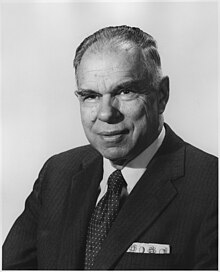Glenn Seaborg
| Glenn T. Seaborg | |
|---|---|

Seaborg in 1964
|
|
| Born | Glenn Theodore Seaborg April 19, 1912 Ishpeming, Michigan |
| Died | February 25, 1999 (aged 86) Lafayette, California |
| Nationality | United States |
| Fields | Nuclear chemistry |
| Institutions | |
| Alma mater |
|
| Doctoral advisor | |
| Doctoral students |
|
| Known for | his contributions and he was part of a team to the synthesis, discovery and investigation of ten transuranium elements |
| Notable awards |
|
| Signature | |
Glenn Theodore Seaborg (/ˈsiːbɔːrɡ/; April 19, 1912 – February 25, 1999) was an American chemist whose involvement in the synthesis, discovery and investigation of ten transuranium elements earned him a share of the 1951 Nobel Prize in Chemistry. His work in this area also led to his development of the actinide concept and the arrangement of the actinide series in the periodic table of the elements.
Seaborg spent most of his career as an educator and research scientist at the University of California, Berkeley, serving as a professor, and, between 1958 and 1961, as the university's second chancellor. He advised ten US Presidents – from Harry S. Truman to Bill Clinton – on nuclear policy and was Chairman of the United States Atomic Energy Commission from 1961 to 1971, where he pushed for commercial nuclear energy and the peaceful applications of nuclear science. Throughout his career, Seaborg worked for arms control. He was a signatory to the Franck Report and contributed to the Limited Test Ban Treaty, the Nuclear Non-Proliferation Treaty and the Comprehensive Test Ban Treaty. He was a well-known advocate of science education and federal funding for pure research. Toward the end of the Eisenhower administration, he was the principal author of the Seaborg Report on academic science, and, as a member of President Ronald Reagan's National Commission on Excellence in Education, he was a key contributor to its 1983 report "A Nation at Risk".
...
Wikipedia
